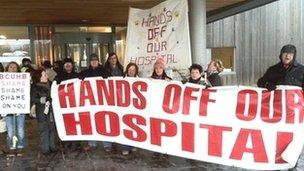Wales NHS: Complaints to ombudsman more than triple
- Published
Complaints have increased from 191 in 2006/7, when his office was created, to an estimated 680 for 2012/3
Complaints to a public watchdog about the Welsh NHS have more than tripled in six years, BBC Wales has learned.
Public services ombudsman Peter Tyndall says some of the rise is due to unhappiness over the quality of care, and warns that services will become less safe without change.
Complaints have increased from 191 in 2006/7, when his office was created, to an estimated 680 for 2012/3.
The figures have been revealed amid controversy over a major NHS shake-up.
BBC Wales' Week In Week Out obtained the figures as it examined the future of the NHS and the row surrounding the process of consultation, which the chair of one community health council (CHC) described as a "charade".
Local health boards (LHBs) across Wales are going through the process of finalising reorganisation plans, many of which have led to opposition and demonstrations.
But the Welsh government has insisted that change is essential, and First Minister Carwyn Jones warned earlier this month that health services in Wales would collapse without reorganisation.
The cases that have been reported to Mr Tyndall's office in the past year range from issues with ambulances and GP practices to hospitals to waiting times.
Mr Tyndall said: "Of the health complaints we investigate we tend to uphold more than half. Part is due to the higher profile of the office and the complaints system within the NHS; some of it inevitably has to be down to the fact that there's growing dissatisfaction with the quality of care they receive.
"Are people being treated as people and are they receiving food - just the very basics of care? We also have particular worries about the quality of monitoring and record-keeping and so on.
"You can't continue with the NHS as it's currently delivered to meet ever-increasing levels of need with finite resources.
"So unless you change, then services will become less safe."
Health Minister Lesley Griffiths said: "We have put regulations in place where people know how to complain and if something has gone wrong people have the right to complain.
"We have an NHS in Wales to be proud of I get really fed up with people talking it down all the time. When I go into hospital or health care settings I don't think I have ever come across a patient who has criticised.
"Of course things go wrong when you have human beings treating human beings - there's always going to be times when things go wrong."
She repeated the message that change was needed.
"We are concerned that if we don't do something now services in the future will collapse could collapse," she said.
The row over the shake-up is expected to intensify this week as CHCs representing mid, west and north Wales continue to discuss whether to refer reorganisation of health services in their areas to Mrs Griffiths for her to determine.
The minister said she realised she may have to make difficult decisions: "You are not in this job to be popular, but I also know I couldn't sleep in my bed if I thought a service was going to collapse and I cannot support unsafe services."
Hywel Dda Health Board has spent £125,000 on its public consultation, and Betsi Cadwaladar University Health Board £126,000.
That process has been branded a "charade" by the chairman of the local watchdog for patients served by Hywel Dda.
CHC chairman Tony Wales admitted his relationship with the board was at an all-time low.

Protesters from Flint at a meeting of Betsi Cadwaladr University Health Board
"The reason I use those words - charade - is that these are the words that have been said to me by many people," he said.
"You would have to argue that they did listen but sometimes you wonder - did it come into one ear and go out the other?"
Hywel Dda LHB insisted it has listened to local views, but that its proposals were for a better, safer and more sustainable service.
Conservative AM Darren Millar, chairman of the assembly's Public Accounts Committee, said: "I think the Wales Audit Office needs to look at whether these public consultations are value for money.
"We know hundreds of thousands of pounds of taxpayers' money is expended on trying to engage the public in decision making and then the outcome of those consultations appears to most people to have been completely ignored. That is not a good use of taxpayers' money."
Betsi Cadwaladr board said it had to change to ensure it could continue delivering safe sustainable services and all its decisions were based on clinical evidence.
Week In Week Out: Critical Condition is on BBC One Wales at 22:35 GMT on Tuesday, 12 February.
- Published3 February 2013
- Published8 February 2013
- Published22 January 2013
- Published5 February 2013